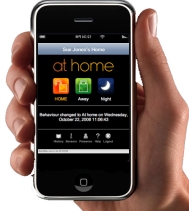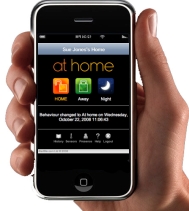 AlertMe iphone app.Photo: Courtesy of AlertMeI’m sitting in a conference room at a PR agency on the San Francisco waterfront when the chief executive of AlertMe, a British energy management startup, pulls out his iPhone to check on a colleague’s kilowatt consumption back in the U.K.
AlertMe iphone app.Photo: Courtesy of AlertMeI’m sitting in a conference room at a PR agency on the San Francisco waterfront when the chief executive of AlertMe, a British energy management startup, pulls out his iPhone to check on a colleague’s kilowatt consumption back in the U.K.
The executive, who has the Vonnegutian name of Pilgrim Beart, taps the “history” icon on the screen. “I can see that his wife has arrived home,” he says before touching the energy button.
“They’re watching TV right now,” Beart notes, staring at the iPhone screen. “I could turn the TV off if I wanted to wind them up. I won’t do that. But I will turn off the microwave as no one is using it right now.”
He touches the screen and, voila, 5,300 miles away, the microwave blinks off, saving its owners a few pence and reducing the load on the grid by a watt.
All very cool. And a bit creepy.
Beart has a window into his colleague’s home life because the house is outfitted with AlertMe smart plugs that monitor appliances’ electricity use. Other gadgets track the home’s temperature. Key fobs carried by the homeowners keep tabs on their comings and goings so AlertMe’s software can adjust heating and cooling and turn appliances on and off to maximize energy efficiency.
Of course, Beart’s use of the iPhone as Big Brother was purely for demo purposes. In real life, AlertMe customers’ data remains anonymous. However, homeowners can monitor and control their electricity use on their smartphones.
AlertMe is one of a growing number of startups competing to help consumers cut their electricity use by providing real-time data and services to manage energy consumption. The company is backed by Silicon Valley and European venture capital firms, including VantagePoint Venture Partners, Good Energies, and Index Ventures.
What caught my attention is AlertMe’s strategy. Beart is attempting to build a consumer brand and he’s doing it without relying on digital smart meters, which utilities are slowly rolling out to provide real-time data on electricity use.
U.K. residents can order AlertMe’s energy system in a box for £69 ($111) and a £2.99 ($4.83) monthly service charge. The iPod-white gadgets include a reader that attaches to a conventional electricity meter and wirelessly transmits real-time energy data to a hub plugged into the home’s broadband connection. Spring for the pricier AlertMe security package — £249 ($402) with a monthly charge of £9.99 ($16) — and you get smart plugs and key fobs as well.
“AlertMe can sit around and say, ‘This person always gets up at half past six in the morning so I need to make sure the house is comfortable then, and they leave the house about 9 so I can start to let the temperature tail off,'” says Beart.
The smart plugs monitor electricity use of individual appliances. Homeowners can set up rules so that, say, power is automatically cut to appliances when they leave the house while shutting down heating and cooling systems.
“The fact is that AlertMe knows a lot about the consumer,” say Beart. “The consumer just has arrived home and the next thing they usually do is put the kettle on for a cup of tea, to use a very British example. That kind of intelligence and understanding of the lifestyle of the homeowner is really valuable.”
With a tap on the iPhone, for instance, Beart learns that his U.K. colleague’s kettle has cost him 18 pence (30 cents) over the past week and that the house currently is consuming 811 watts.
Customers can monitor and manage their energy use at AlertMe’s website, on their phone or through Google’s PowerMeter service, thanks to a deal the company struck in October with the search giant.
“Our vision is to be able to show people where their money is going, appliance by appliance,” Beart says. “They can decide if they want to buy a more energy efficient refrigerator or boil less water when they make a cup of tea.”
The vision for the smart grid involves smart appliances that will interact with utilities and each other to manage a home’s energy use — the dishwasher will tell the washing machine to delay a spin cycle until electricity rates fall in the evening. But it will be some years until such appliances become common, given that most people replace their refrigerators and dishwashers only every five to 10 years.
Beart won’t say how many customers AlertMe has signed up since launching in October. “We’ve talked about thousands of customers in our presentations,” he says. “Our goal is to get millions in short order. This is a mass-market consumer play.”
AlertMe plans to bring the service to the United States sometime in the near future. In Europe, the company is marketing its energy kits directly to consumers but also foresees selling services through partners like utilities, Internet providers, and solar panel installers.
A couple of weeks later I sat down with Neil Rimer, co-founder of AlertMe investor Index Ventures, when he was in town from Geneva.
“What we love about AlertMe is that they actually have a product that you can touch and feel and that they’re not dependent on smart grids or utilities,” says Rimer.
“There will be an Apple of energy efficiency,” he adds. “Some company that captures that share of mind in the consumer and is equated with these products that help you save energy and are a pleasure to use and actually improve your lifestyle.”
It’s far too early to say whether AlertMe will be that killer (iPhone) app. Competitors such as EcoFactor or Tendril are already taking their own unique approaches, and there may well be some stealthy startup out there toiling away in the proverbial Silicon Valley garage.



